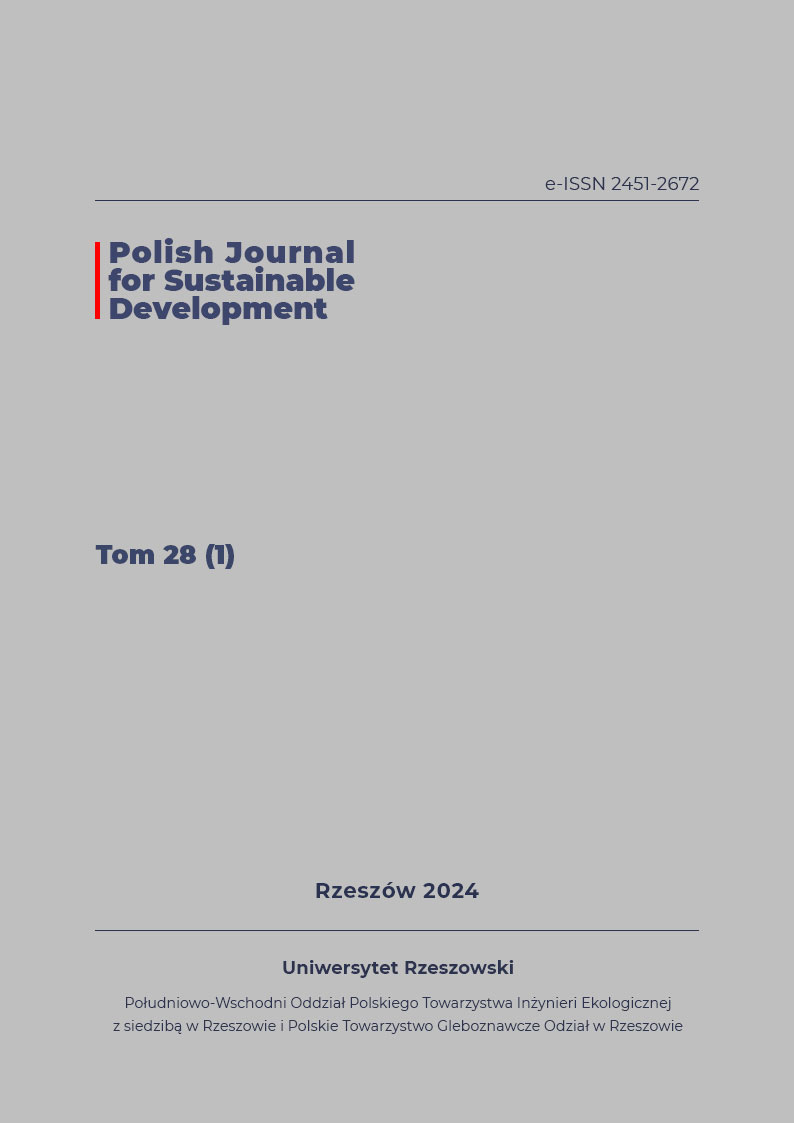Zrównoważony transport żywności elementem ograniczenia zużycia zasobów
DOI:
https://doi.org/10.15584/pjsd.2024.28.1.23Słowa kluczowe:
zrównoważony rozwój, retardacja, transport, żywność, zanieczyszczenia, łańcuch dostawAbstrakt
Celem pracy było oszacowanie możliwości wprowadzenia alternatywnych rodzajów napędu w samochodach ciężarowych oraz ograniczenie transportu żywności celem zmniejszenia emisji gazów cieplarnianych. Zrównoważenie transportu można osiągnąć poprzez przejście na bardziej wydajne środki transportu i/lub pojazdy o niższej emisji, zwłaszcza o napędzie elektrycznym lub wodorowym. Kluczowym w tym przypadku jest rozwój dedykowanej infrastruktury ładowania oraz uruchomienie programów wsparcia dla zakupu takiej floty. Konieczne jest również przekształcenie systemów żywnościowych w taki sposób, aby konsumenci w większym zakresie korzystali z żywności produkowanej lokalnie i sezonowo. Optymalizacja dystrybucji, w tym krótkich łańcuchów dostaw może również przyczynić się do realizacji zrównoważonego transportu. Wymienione działania sprzyjają retardacji antropopresji w środowisku przyrodniczym.
Downloads
Bibliografia
Akaichi F., Nayga R.M., Nalley L.L. 2017. Are there trade-offs in valuation with respect to greenhouse gas emissions, origin and food miles attributes? European Review of Agricultural Economics. 44(1). 3-31. https://doi.org/10.1093/erae/jbw008
Aljohani K. Thompson R.G. 2018. The impacts of relocating a logistics facility on last food miles–The case of Melbourne’s fruit & vegetable wholesale market. Case studies on transport policy. 6(2). 279-288. https://doi.org/10.1016/j.cstp.2018.03.007.
Bloemhof J.M., Soysal M. 2017. Sustainable Food Supply Chain Design. In Sustainable Supply Chains. Y. Bouchery, C.J. Corbett, J.C. Fransoo, T. Tan (red.). Springer: Amsterdam. 395-412.
Consumption Monitor 2024. Fresh Fruit and Vegetables Production, Trade, Supply, and Consumption Monitor in the EU-27. Freshfel. https://freshfel.org/what-we-do/consumption-monitor/ [dostęp 15.04.2024].
Doomernik J., Garcés-Mascareñas B., Güell B. 2023. Seasonal workers in agriculture: The cases of Spain and The Netherlands in Times of Covid-19. In: Migration Control Logics and Strategies in Europe: A North-South Comparison, 209-226. Cham: Springer International Publishing.
European Environment Agency (EEA). EEA Report No 02/2022. Transport and environment report 2021. Decarbonising road transport - the role of vehicles, fuels and transport demand. [dostęp 15.04.2024 r.].
European Fresh Produce Associaton. Źródło: https://freshfel.org/freshfel-europes-consumption-monitor-shows-that-there-is-still-a-long-way-to-go-to-reach-the-minimum-recommendation-of-400-g-day-of-fresh-fruit-and-vegetables-2/
European Statistics Handbook. 2024. Fruit Logistica. Messe Berlin GmbH.
Gonçalves A., Zeroual T. 2017. Logistic Issues and Impacts of Short Food Supply Chains: Case Studies in Nord – Pas de Calais, France. In Toward Sustainable Relations between Agriculture and the City. C.T. Soulard, C. Perrin E. Valette (red.). Springer: Berlin – Heidelberg. 33-49.
Hoehn D., Laso J., Margallo M., Ruiz-Salmón I., Amo-Setién F.J., Abajas-Bustillo R., Sarabia C., Quiñones A., Vázquez-Rowe I., Bala A. 2021. Introducing a Degrowth Approach to the Circular Economy Policies of Food Production, and Food Loss and Waste Management: Towards a Circular Bioeconomy. Sustainability. 13. 3379. DOI:10.3390/su13063379.
IEA 2024. Global EV Outlook 2024. Moving towards increased affordability. International Energy Agency.
Krug A., Knoblinger T., Qvist O. 2023. Truck electrification — profit booster or white elephant? Opportunities and challenges for manufacturers and operators from a charging perspective. Arthur D. Little.
Kucharczyk M., Krzywonos M., Wilk M., Seruga P., Borowiak D. 2015. Etnocentryzm konsumencki a produkty regionalne. Prace Naukowe Uniwersytetu Ekonomicznego we Wrocławiu. 411. 87-96.
Leleń P. 2016. Analiza możliwości wykorzystania transportu kolejowego do przewozu wybranych gatunków świeżych owoców i warzyw – podatność transportowa. Technical Issues.4. 40-46.
Li M., Jia N., Lenzen M., Malik A., Wei L., Jin Y., Raubenheimer D. 2022. Global food-miles account for nearly 20% of total food-systems emissions. Nature Food. 3(6). 445-453.
Malak-Rawlikowska A., Majewski E., Wąs A., Borgen S.O., Csillag P., Donati M., Freeman R., Hoàng W., Lecoeur J.-L., Mancini M. C., Nguyen A., Saïdi M., Tocco B., Török Á., Veneziani M., Vittersø G., Wavresky P. 2019. Measuring the Economic, Environmental, and Social Sustainability of Short Food Supply Chains. Sustainability. 11(5). Doi: https://doi.org/10.3390/su11154004.
McKinsey Center for Future Mobility. 2022. Preparing the world for zeroemission trucks. The mainstays of commercial road transport will soon benefit from cost-effective, zero-emission horsepower. Copyright © McKinsey & Company.
Migdał W., Migdał Ł. 2021. Od pola do stołu – wymagania konsumentów w stosunku do rolników. ŻYWNOŚĆ. Nauka. Technologia. Jakość. 4(129). 24-46.
Parlament Europejski. 2023. Emisje CO2 z samochodów: fakty i liczby (infografiki). https://www.europarl.europa.eu/topics/pl/article/20190313STO31218/emisje-co2-z-samochodow-fakty-i-liczby-infografiki [dostęp: 15.04.2024].
Phan T. X. D. 2024. Understanding the acquisition, usage, and disposal behaviours in sustainable food consumption: a framework for future studies. Cleaner and Responsible Consumption. 12. Doi: https://doi.org/10.1016/j.clrc.2023.100162.
Pradhan P., Lüdeke M.K.B., Reusser D.E., Kropp J.P. 2014. Food self-sufficiency across scales: how local can we go? Environmental Science and Technology. 48(16). 9463-9470. DOI:10.1021/es5005939.
Ran Y., Lewis A. N., Dawkins E., Grah R., Vanhuyse F., Engström E., Lambe F. 2022. Information as an enabler of sustainable food choices: A behavioural approach to understanding consumer decision decision-making. Sustainable Production and Consumption. 31. 642-656.
Rozporządzenie Parlamentu Europejskiego i Rady (UE) 2019/1242 z dnia 20 czerwca 2019 r. określające normy emisji CO2 dla nowych pojazdów ciężkich oraz zmieniające rozporządzenia Parlamentu Europejskiego i Rady (WE) nr 595/2009 i (UE) 2018/956 oraz dyrektywę Rady 96/53/WE.
Rozporządzenie Parlamentu Europejskiego i Rady (UE) 2019/631 z dnia 17 kwietnia 2019 r. określające normy emisji CO2 dla nowych samochodów osobowych i dla nowych lekkich pojazdów użytkowych oraz uchylające rozporządzenia (WE) nr 443/2009 i (UE) nr 510/2011.
Schulze M., Janssen M., Aschemann-Witzel J. 2024. How to move the transition to sustainable food consumption towards a societal tipping point. Technological Forecasting and Social Change. 203. Doi: https://doi.org/10.1016/j.techfore.2024.123329.
Silvestrini M.M., Smith N.W., Sarti F.M. 2023. Evolution of global food trade network and its effects on population nutritional status. Current Research in Food Science. 6. 100517. https://doi.org/10.1016/j.crfs.2023.100517.
Szymańska E. J., Lukoszová X. 2019. Krótkie łańcuchy dostaw produktów żywnościowych. Ekonomika i Organizacja Logistyki. 4(1). 91-101.
Tłuczak A. 2020. Wybrane metody lokalizacji logistycznych centrów dystrybucyjnych. Zeszyty Naukowe Szkoły Głównej Gospodarstwa Wiejskiego w Warszawie. Ekonomika i Organizacja Logistyki. (52). 43-52.
Walendzik M., Łepkowski M., Nowacki G. 2016. Wpływ transportu drogowego na środowisko naturalne człowieka i zagrożenia występujące w transporcie drogowym rzeczy. Autobusy. 6. 459-464.
Wojciechowska-Solis J. 2022. Etnocentryzm konsumencki na rynku produktów lokalnych: determinanty zachowań konsumenta. Zagadnienia ekonomiki rolnej. 373(4). 75-92.
Pobrania
Opublikowane
Numer
Dział
Licencja
Prawa autorskie (c) 2024 Polish Journal for Sustainable Development

Utwór dostępny jest na licencji Creative Commons Uznanie autorstwa – Użycie niekomercyjne – Bez utworów zależnych 4.0 Międzynarodowe.


